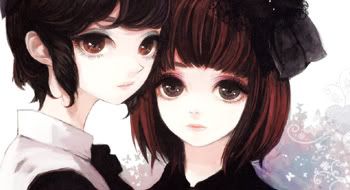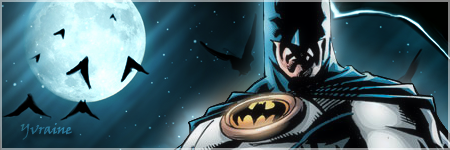Quote
This is very informative: http://www.insidescanlation.com/history/index.html
"First Generation: The Classical Era, i. The land before time"...!?
It sounds like fun. I'll read them on the weekend, otherwise I would get lack of sleep : ).
>NightSwan
Quote
Besides, it's the internet, where everything is very easily accessible.
>crazyboutcute
Quote
Agreed with NightSwan here. It's the Internet, so it's pretty much anything goes -- with scanlations, videos, literature, etc. It's the parents' responsibility to monitor what their kids are accessing online.
Yes indeed, it is accessibility I'm worrying about.
As for manga, I learnt naturally where I could get titles for girls and my favorites (and where have to avoid) by distinguishing comic series' name (like Hana to yume comics, Margaret comics etc.), its color and font style of each publisher on book jacket at real book store, increased knowledge about genre, authors and publishers, then extended the skill to online book store and fansite.
On the other hand everyone can get and read everything by a click without any knowledge and streetwise in a scanlation website. It feels like driving a car without driver's licence on a freeway to me.
>-shiratori-
Quote
Also, I agree with you that pornographic comics should not be displayed next to family-friendly ones, but unfortunately many people here think that's okay (in real life as well: many comic stores in the West are small, so they often put childrens' comics next to adult comics).
I'm glad you are sharing the same view with me.
By the way, the line ''こ...ここが勝負 の分かれ目です っ'' in your avatar image always make me smile when I see her...it sounds so funny : ).
>-shiratori-
>cecropiamoth
Quote
The bottom line is: I don't like Western culture, so by spreading Japanese culture (through scanlation) I feel like I'm making the world around me a little bit better.
Quote
I agree with every word quoted above, and that's why I, at age 67, read manga.
I think we seek things what we don't have or see nearby. I frequently utter “kawaii” and like cute things in Japanese culture, but I love non-cute things (sorry!) in Western culture too.
For example, I'm a big fun of watching major sports in USA on TV. Game of NFL or NBA can't possibly be cute, but I admire their power/speed/technique that Japanese player would never reach. And watching their play make me feel better because of its impossibility. Maybe people need something beyond everyday life. In the sense, I can clearly understand your (-shiratori-'s) motivation as scanlator.
>cecropiamoth
Quote
(Plus I admire Japanese culture, and I think it can be understood very well through its main popular fiction form, manga.
Sadly, Japanese culture has also its own fault like all other culture, but I'm very happy knowing that you enjoy reading manga : ).
>hahhah42
I would never know those artists if I didn't ask the question in this site. Thank you : ).
>cmertb
Thank you for your advise. I definitely need some time for research, there is so much information in the forum : ).
>residentgrigo
Quote
The world of scanlation was never just a phenomenon relegated to manga. I read tons of European comics that were scanlated by fans in the same way manga are too but these mostly live on dedicated forums and not on online readers. (License holders would murder them if they did that on a big scale as the west is way more up to date with digital rights matters.) US comics also get scanlated into all sorts of languages.
It seems like people having license in Europe is much cleverer than one in Japan and other countries. Now I learned that scanlation is everywhere and even from European and American comics. Maybe its all a matter of degree.
-*--*--*--*--*--*--*--*--*--*--*--*-
>MaiNina
Quote
Kanji in itself is very complex and needs more mastering than hiragana and katakana, as you yourself probably know too, so various applications and scripts are used to help translate kanji without any furigana.
"various applications and scripts", those are new to me : ). If result were good enough, it would help translators a lot. I like ambiguity and variety in written Japanese with kanji, but come to think of its complexity, using Japanese in manga (many overseas people wanting to read) seems terrible joke or something...
Quote
Which also shows that a vast majority of translators in the scanlation world are not actually Japanese, but just manga fans who learned the language by themselves or in school.
That solved my question about "fried ginger" incident: a character's line in a manga "Wanna eat a fried ginger’s box for lunch".
When I read it, I wondered what he meant for a little while; "Tempura of ginger? Stir-fry ginger? Who else would eat such thing as side dish of lunch box?". As you probably noticed, actually, it is a lunch box of "shogayaki" : ).
(If you literally translate "shogayaki", it would be "fried ginger". But its essence is pork (usually not other meat) sautéed (fried) with ginger. Perhaps "fried pork" was better translation if you felt "pork fried with ginger" is too long.)
Quote
As there is an increasing demand for faster releases of manga, more people give up on waiting and sit down and learn the language themselves in order to translate the chapters and release them to the public. Well, due to the focus on speed a lot more than on the quality, future and wannabe translators focus on mastering the basics of Japanese language, as that pretty much helps them get through the chapters without the need to focus on kanji.
What you said has made me think about various things.
As for speed and quality, it seems that everything would depend on translator's conscience.
If translators can't take much time for translating, how about leaving the original word (they were not sure about) in alphabet without translating? Reader demanding speed wouldn't care about quality, people having interest in the meaning could look up the word online themselves. This could only apply vocabulary, but maybe save some time for them.
Even though I hope translators of manga have at least basic knowledge of the culture in original language or try to make an effort to research (google) the meaning of a word.
Last edited by amenoumi0340 at 10:13 pm, Nov 20 2015





